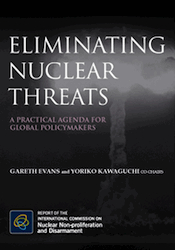International Report Calls for the Elimination of Nuclear Threats
December 15, 2009
Featured Image
We are happy to serve you a daily summary of the day's top nuclear policy stories each morning, with excerpts from the stories in bullet form.
Stories we're following today:
New Report Calls for Nuclear States to Reduce Arms - Global Security Newswire [link]
- Nations with nuclear arms are expected to be called on to reduce their strategic arsenals and to adopt a "no first use" stance in a new report slated for release tomorrow in Tokyo, the Australian Associated Press reported.
- The report by the International Commission on Nuclear Nonproliferation and Disarmament is expected to urge a worldwide nuclear arms rollback to 2,000 weapons, roughly 10 percent of today's stockpile, by 2025. The commission is also predicted to call on nations to assume a "no first use" policy by that year.
- To encourage states to agree to only fire their nuclear weapons if attacked, the report is thought to recommend that all nuclear arms be removed from high-alert status so that they could not be quickly launched.
- The commission is also expected to call for universal participation in the Comprehensive Nuclear Test Ban Treaty and to encourage a new agreement that would outlaw the production of any highly enriched uranium and plutonium for weapons purposes.
- Click here to read the full report.
Our Nuclear Stance Must Go Beyond Deterrence - Op-Ed in the Sydney (Australia) Morning Herald [link]
- [The report of the International Commission on Nuclear Non-prolfieration and Disarmament] is important because for the first time, an American president is committed to long-term nuclear disarmament. Japan and Australia can and should do much to support Barack Obama.
- Australia and Japan, joint sponsors of the commission, need to be more explicit about their own roles. ...Clear policies from Australia and Japan would support Obama. Unless they do so, Australian and Japanese commitment to a world free of nuclear weapons must be in doubt.
- We urge the Government to work with Japan and jointly propose to the US that our defensive arrangements be recast to no longer depend on the extended nuclear deterrent. This would be by far the most effective step the two countries could take to achieve a nuclear-free world.
Reports: Iranian Detonator Document Found - Laura Rozen in Politico [link]
- Western officials and IAEA scientists are studying an alleged Iranian technical document said to assess the testing of nuclear warhead detonators, the Washington Post reports.
- Western officials have suggested going back to at least June that there was evidence pointing to Iranian work on nuclear triggers devices, but did not reveal what that evidence was.
Sanctions Bill Will Undercut Growing International Consensus on Iran - Max Bergmann in the Wonk Room [link]
- In the midst of its efforts to engage Iran, the Administration has been working simultaneously to build a unified international approach toward Iran – something that was sorely lacking during the Bush administration. These efforts appear to have paid dividends, as there now exists a pretty clear consensus between the US and Europe on dealing with Iran and there is even some mild optimism that Russia may support come on board as well.
- Despite the formation of a multilateral consensus, the US Congress now seems determined to screw things up by imposing unilateral sanctions.
- In other words, the sanctions bills pushed by Congress will likely backfire. Not only will they undercut the Green Movement, as Matt Duss notes, but by upsetting the delicate international consensus that currently exists on Iran, this legislation if enacted will in the end only leave Iran less isolated. In this sense, the Iranian Revolutionary Guard could not have written an oped more favorable to their interests this morning than the one penned by Rep. Ileana Ros-Lehtinan.
Bye-Bye Bomber - Newsweek [link]
- For half a century, America has deployed a "nuclear triad": warheads aboard land-based intercontinental missiles; aboard a fleet of Trident submarines; and aboard the B-52H and B-2 as bombs and cruise missiles.
- Remarkably, a study just published by the Air Force's main lobbying organization, the Air Force Association, concludes that the nation "should gradually shift to a dyad" of submarines and missiles, phasing out bombers. The reasoning: the nation's bomber fleet is largely antiquated, and the latest-generation plane, the bat-winged B-2 (also known as the stealth bomber), costs about $2 billion apiece.
Reducing the Nuclear Threat: The Argument for Public Safety - Richard Rhodes in the Bulletin of the Atomic Scientists [link]
- To advance the cause of public health it was necessary to depoliticize disease, to remove it from the realm of value and install it in the realm of fact. Today we have advanced to the point where international cooperation toward the prevention, control, and even elimination of disease is possible among nations that hardly cooperate with each other in any other way.
- Public health is medicine's greatest success story and a powerful model for a parallel discipline, which I propose to call public safety.
- Where nuclear weapons--the largest-scale instruments of man-made death--are concerned, the elements of that discipline of public safety have already begun to assemble themselves: materials control and accounting, cooperative threat reduction, security guarantees, agreements and treaties, surveillance and inspection, sanctions, forceful disarming if all else fails.
- Nuclear weapons operate beyond good and evil. They destroy without discrimination or mercy: Whether one lives or dies in their operation is entirely a question of distance from ground zero.



